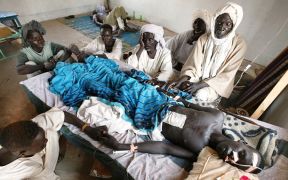UN votes sanctions against four Sudanese over Darfur
April 25, 2006 (UNITED NATIONS) — With Russia and China abstaining, the UN Security Council ordered financial and travel sanctions on four Sudanese blamed for bloodshed and rights abuses in Darfur.
 Twelve of the council’s 15 members voted for the US-drafted resolution, which was co-sponsored by Argentina, Britain, Denmark, France, Japan, Peru and Slovakia.
Twelve of the council’s 15 members voted for the US-drafted resolution, which was co-sponsored by Argentina, Britain, Denmark, France, Japan, Peru and Slovakia.
China and Russia, two of the five veto-wielding permanent members, joined Qatar in abstaining. They argued that sanctions could adversely affect inter-Sudanese peace talks in Abuja, Nigeria.
“This resolution demonstrates that the Security Council is serious in its efforts to restore peace and security in the region and, far from interfering in the peace process in Abuja, it will strengthen that process,” said US Ambassador John Bolton.
He said other Sudanese figures might be targeted for sanctions if they were also found to have perpetrated atrocities in Darfur.
The council also unanimously approved a non-binding Tanzanian-drafted statement expressing full support for the Abuja peace talks and calling on the Khartoum government and Darfur rebels to reach a deal by a Sunday deadline set by the African Union, which has organised the peace talks, and the international community.
Targeted for a travel ban and an assets freeze were:
– Sheikh Musa Hilal, a leader of the Khartoum-backed Janjaweed (Arab) militia seen as responsible for some of the worst atrocities in Darfur.
– Major General Gaffar Mohamed Elhassan, a former commander of the Western (Darfur) military region.
– Adam Yacub Shant, a commander of the rebel Sudanese Liberation Army.
– Gabril Abdul Kareem Badri, a commander of the insurgent National Movement for Reform and Development.
Hilal’s militia were blamed for pillaging, rape, and scorching of villages in Darfur.
Elhassan had direct operational command of Sudanese government forces in Darfur from 2004 to this year and coordinated operations between the Janjaweed and government forces.
Shant violated a ceasefire agreement in July 2005 when he ordered SLA forces to attack government troops. Three three government soldiers were killed.
Badri kidnapped African Union peacekeeping personnel last October and a month later threatened to shoot down an AU helicopter.
Explaining his decision to abstain, Russian delegate Konstantin Dolgov said the sanctions “might have a negative impact on the prospect for concluding the peace agreement” by the April 30 deadline “and thus would not promote efforts to establish peace and security in Darfur and Sudan as a whole.”
Qatar’s UN envoy Nassir Al-Nasser said he abstained because “we did not find proof that would condemn these people and justify sanctions being leveled against them.”
China’s UN ambassador Wang Guangya restated Beijing’s view that sanctions “more often than not cannot bring expected results”.
Bolton meanwhile expressed regret that the council vote was not unanimous.
But he noted that the council’s veto-wielding permanent members “are fully aware that when they abstain assuming there’s a nine-vote majority in favor that they are allowing the sanctions to proceed.”
In a warning to the Sudanese government, he said: “the first thing we need is cooperation from the government in Khartoum to let in the UN assessment team” tasked with making a plan for UN takeover of the African Union peacekeeping mission in Darfur.
Britain’s UN ambassador, Emyr Jones Parry, announced that he would be leading a mission to Sudan for the Security Council in the first week of June.
The Security Council vote came more than a year after it authorized sanctions against those responsible for the Darfur strife, where rebels and government-backed militias have been battling since February 2003.
The conflict has left up to 300,000 people dead from violence or disease and more than 2.4 million homeless. Washington has branded the violence as “genocide”
The council also approved a non-binding statement voicing concern about the deteriorating relations between Sudan and its neighbor Chad. Chad broke off diplomatic relations with Sudan 10 days ago, accusing it of arming rebels who tried to storm the capital N’Djamena.
(ST)
